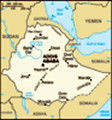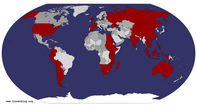Advertisement
My final bus journey in Ethiopia is to be spread over two days, with just seven hours of travel on each day. Seven hours is a bearable duration, especially with the road being tarmac all the way to the Kenyan border. The bus does not depart full, with the engine housing acting as a seat for only two people. We depart at 6AM on both days and it's only one lane each way so there are numerous hold-ups while we wait to overtake slower vehicles, but these two days are arguably the most pleasant that I spend on Ethiopian transport.
Since my last bus journey, I have read that the Ethiopian aversion to opening windows is because of a belief that draughts can cause infection. This would be an amusing little quirk if it didn't fly in the face of medical opinion - poor ventilation encourages the spread of umpteen different diseases, and in particular tuberculosis thrives in such circumstances. More to the point, though, it means all passengers have to boil throughout the duration of their journeys, which is just one more insult to be added to the injury of travelling on these buses. The "13 months of sunshine" slogan used by the Ethiopian Tourist Board only seems to ram home the fact that you have 1.0833 times as much heat to deal with as you would in any other country.
However it helps that I know that I will soon be leaving, and I put on my MP3 player to provide a soundtrack to the passing of the landscape. We trundle past lakes, a couple of vineyards, and several flower farms - apparently Ethiopia is trying to break into the flower export business that is currently dominated by Kenya. At one point I see brightly coloured and detailed graves by the roadside. There are many signs in romanised Amharic, which I don't recall seeing anywhere else in the country.
We pass the town of Shashemene on the way south, which is famous because of its Rastafarian community. Between the wars, Marcus Garvey's "return to Africa" movement in Jamaica had been gathering strength, and the coronation of Haile Selassie (formerly Prince Ras Tafari) in 1930 was viewed as the coming to pass of a biblical prophecy that kings would come out of Africa. The religion of Rastafarianism was created with Selassie its divinity - much to his embarrassment - and ganja its principal sacrament. The emperor granted the Rastas a chunk of land in Shashemene in the '60s and there is now a community of several hundred there, however the relationship with the locals appears to be a reluctant tolerance rather than any integration.
At Awasa it starts to rain, causing even the driver's window to be closed, and the air inside becomes hot and stuffy. I grind my teeth in frustration as I see the driver and his assistants continually wiping the windscreen and windows to stop them steaming up. Just open the freakin' things slightly and everything will be OK, I want to scream. I will not miss this.
Dila is the town where the bus will stop for the night, and as we approach it I fall into conversation with a local man who is a pastor in a Swedish evangelical Christian organisation. He is heading slightly further south to attend a rally where he hopes to convert a good proportion of the expected 70,000 crowd. He claims that about a quarter of the country is now evangelical, which seems much too high a figure, and a grin lights up his face as he says that converting the whole of Ethiopia is his ultimate goal. It strikes me that First World countries can afford the time and money for such frivolities as changing religion, yet religion is becoming increasingly meaningless in such places - however, in countries like Ethiopia where the most basic amenities and services are denied to the majority of the population, missionary activity is a growth industry.
Dila is not a particularly attractive town, and the recent rains have made its main street a sucking, muddy mess. I draw the conclusion that few whities pass through here, as stares and suspicious mutterings of "Faranji" follow me around. A man stops me and asks if I am a bastard. Of course, I assume that I've misheard but he repeats the question and it still sounds very much like what I'd first thought. I can't for the life of me figure out why anyone would say such a thing, but he then asks if I would like to kiss his hand. Now I understand - this is the town's nutcase.
Every cafe I visit has either no food or no-one able to understand my request for spaghetti. Assistance comes in the unexpected shape of Roy, an Indian from Kanyakumari who has spent most of his life in Ethiopia - as he is walking past, he hears me struggling to order and steps in to help. He seems to be keen on the idea of an extended chat so we arrange to meet up later.
Once evening has fallen, Roy drops by my room and we head to another hotel with a pleasant balcony overlooking the lights of Dila. He says that the region produces the best coffee in Ethiopia so we try some - as mentioned before, I'm no connoisseur but it certainly isn't repulsive. Brought up in Addis, Roy now runs a private school in Dila with his Ethiopian wife. He started with just $700 of savings, keeping costs low by making most of the school's furniture himself. An initial intake of 85 kids has swelled to nearly 800 in just six years. State-provided education is free but is low quality, apparently because many of the teachers didn't want to be teachers in the first place - they applied to study other, more popular, subjects at university but a quota system meant they were forced into teaching. Most Ethiopian parents choose the free state education system rather than spending money for the better private one - that's assuming they haven't packed their kids off to work in the fields.
Roy's school pays better than the government ones, and he vets the teachers closely to ensure they actually have a passion for their work. Maybe 5%!o(MISSING)f the pupils are on scholarships to help them cover the fees. He brings in successful local people to talk to the students, to show that education can lead to prosperity. He also tries to encourage each child to dream big - one of his strongest criticisms of the country is that Ethiopians are too passive and willing to be blown around by circumstance instead of taking charge of their own direction. I wonder how much that has to do with the vast amounts of foreign aid that have come in. One of his own theories is that
injera is lacking in carb content so maybe locals don't get the same energy boost that potato- and rice-eating peoples get. I can't help but feel an enormous respect for the man, toiling away in this little-known corner of the world with a vision, sense of purpose, and dedication that I am painfully aware are missing in my own life. Fannying around on an extended global tour has never seemed so indulgent. I give him my e-mail address and I hope we will get the opportunity to meet again.
With Dila being the location of my last night in Ethiopia, I reflect on just what the Ethiopian government is doing for its people. It's certainly not providing decent water or electricity supplies, nor an efficient transport system (though I have seen some non-tourist Chinese in my journey through the country, which makes me wonder if they are assisting with infrastructure projects here like they are in Sudan - certainly the ring road around Addis is Chinese-built). Literacy is below 40%!s(MISSING)o education is clearly not a priority. History has shown that the average First World modern society reached a stage where farming became sufficiently productive to allow members of the society to develop other technologies without having the time and energy burden of also generating their own food. Ethiopia seems a long way from that point, with the government presiding over an economy in which more than 80%!o(MISSING)f the people still work in agriculture. Worse, excessive deforestation has created soil erosion that is making agriculture even less productive, and a fast-growing population is meaning there's less food per person anyway.
Set against this, there are airports at all the major tourist spots, even though the price of the tickets is beyond the reach of the vast majority of Ethiopians. The register at the Tourist Information booth in Aksum showed that just six foreigners had signed it in the previous week, a state of affairs which the guy manning the booth said was because almost all tourists come in groups, booked either in Addis or their home country. So it would appear that most of the tourist income in Ethiopia isn't even coming to the people of Aksum, Gonder, Lalibela, and the rest of the tourist trail here.
The parlous state of the country is especially inexplicable when considered in the light of how much foreign aid Ethiopia has received over the years. There are more NGOs in Addis than anywhere else in Africa, supposedly a reflection of the fact that donors like Ethiopia because of its relatively low level of corruption.
It's hard to know where the future lies.
Ethiopia and I have not been a good fit, mainly as the country has exposed the weaknesses of my usual way of travel. Most of my research tends to be web-based, which is not the optimal strategy in a country where the Internet is so poor. Local tourist information booths have been excellent, but knowledge of locations further afield has been sparse. I also am getting too old and too finicky to suck up such constant travel discomfort as Ethiopia has provided unless there's the pay-off of something truly mindblowing - a Taj Mahal, say, or hidden cache of DCMs - at the end. I would have to say that Ethiopia has broken me. Leaving will not be difficult, though it will definitely be with my tail between my legs.
Dull but possibly useful info i. A taxi from Piazza to the bus station costs B45.
ii. The bus from Addis to Moyale costs B99 and takes two days of 7.5 and 7 hours' travel respectively.
iii. I stayed at the Hotel Zeleke in Dila, a couple of hundred metres back up the road from the bus station, paying B60 for a room with double bed and en suite bathroom.
iv. I was allowed to take my rucksack inside the bus with me, but I'd read that if your luggage goes on top of the bus then you won't be given it back in Dila, so you'll need to have your toothbrush with you.
Advertisement
Tot: 0.079s; Tpl: 0.011s; cc: 13; qc: 28; dbt: 0.0348s; 1; m:domysql w:travelblog (10.17.0.13); sld: 1;
; mem: 1.1mb














Mark
non-member comment
Your Blog has been Great
Thanks for all of the interesting blogs about Ethiopia. I plan to travel there soon. I am through Europe, the Middle East, and then dipping into Africa, mainly Egypt, Sudan, and Ethiopia. I will not have a lot of time in Ethiopia maybe two weeks. How long were you there for? If you could keep me posted and give me some info that would be greatly appreciated. Mark